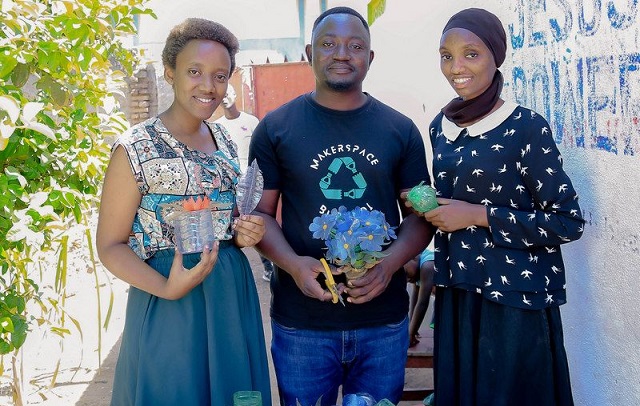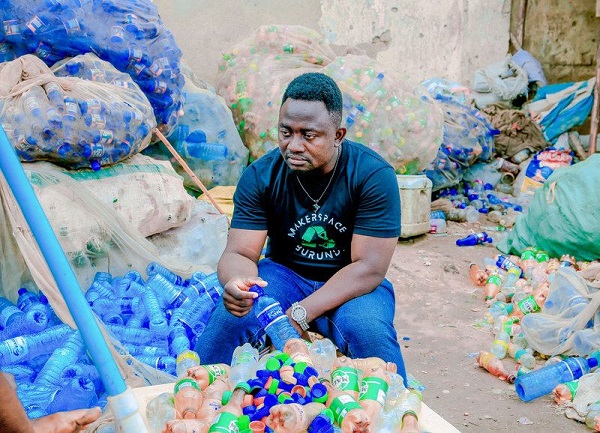
Gad Niyomukunzi makes plastics beautiful decorations and cleans up local rivers
ARTS | BIRD AGENCY | It was the fishermen who finally pushed Gad Niyomukunzi to act. He had been noticing the build-up of plastic bottles in streams in the city he calls home, for years. But when the fishermen of Lake Tanganyika further downstream began complaining – and when their problems led to rising fish prices – he knew it was time to take action.
Three main rivers contribute to the flow of discarded plastics downstream from Bujumbura into Lake Tanganyika. They are the Ntahangwa, the Muha, and the Kanyosha. Niyomukunzi lives near the Kanyosha River, situated in the southern part of Bujumbura.
“For years, I have observed how these plastic bottles are deported to Lake Tanganyika through the streams of the Kanyosha River. Following that, I heard fishermen lamenting the negative impact of plastic pollution on Lake Tanganyika on their fishing practices and poor fish harvests,” Niyomukunzi said.
In 2018, Burundi banned the importation, usage, and manufacturing of plastic bags, As a result, In the first quarter of 2019, imports dropped from around 180 million kilograms to just 82,282 kilograms. Additionally, the import of plastic bottles decreased from 1.6 million kilograms to 628,884 kilograms during the same period, according to the Ministry of Agriculture, Environment, and Livestock and the Burundi Tax Authority.
Since then, however, Burundians have witnessed the gradual rise of discarded plastic on the streets. Although the import of plastics since 2018 remains low, rural and urban communities rely on plastic bottles for a variety of purposes, including the carrying of drinking water, chemicals, fertilisers and palm oil.
During a monitoring exercise in May, Séverin Sindayikengera, the General Director of the Burundi Bureau of Standards and Quality, expressed his disappointment at the re-emergence of single-use plastics and announced heavy fines as a deterrent.
Yet bottles continue to pile up in pools of the rivers and on Lake Tanganyika.
Niyomukunzi realised there was something he could do that would help remove at least a part of the problem and draw people’s attention to the problem. He would draw on his skills as an artist.
“When I first started, I was strapped for cash and only had 25,000 Burundian francs, equivalent to 10 United States dollars, on me. However, I used this money to buy essential tools like scissors, razors, and rulers to get started. It was at the American Corner Kinindo, where I even tried to inspire other young people to join and work with me,” Niyomukunzi explained.

“At first, people thought I went crazy when they saw me collecting plastic bottles,” he says.
American Corner was an English library resource centre where young Burundians could learn English. When it closed its doors, Gad relocated to American Corner Kamenge, in the northern part of Bujumbura.
A musician, poet, fashion influencer and youth leader, Niyomukunzi’s unorthodox solution to the problems was plastic flowers cut out of discarded plastic.
“American Corner provided me with a physical workspace as well as small grants that allowed me to expand this initiative to other areas by training young people, particularly women,” Niyomukunzi said..
In 2017, he registered Maker Space, the company that now recycles plastic bottles into flowers. Since then, the company has recycled over 10 tonnes of plastic bottles and employed 30 full-time workers.
Marie Rose Nizirazana, a representative of American Corner Kamenge, said she was initially taken aback when the artist approached her with his project.
“I knew that plastic bottles could be recycled into tiles and other items, but I had never heard of getting flowers out of them. So, when he approached me, I was both astonished and sceptical about its feasibility. However, he managed to prove his artistic abilities,” Nizirazana said.
“We are now very proud of him because he has trained others, especially young women, on how to handcraft plastic bottles into appealing blossoms and therefore they earn money from selling them. The actions he is undertaking… not only provides employment opportunities for other young individuals but also actively works towards a cleaner and greener world.” she concluded.
Noella Gladus has been involved with Maker Space from the beginning. She was immediately drawn to crafting flowers from plastic bottles, as she has a background in decoration.
“Not only do I make money by selling these plastic-based flowers and Christmas trees, but it has also expanded my knowledge of the decorative industry. Plastic-based decorations are particularly eye-catching in Burundi because they are unique,” Gladus explained.
She says people should not improperly dispose of plastic bottles and bags as they harm the environment.
‘’When these bottles are discarded and it rains, plastic items gathered from urban centres pile up on the shores of these water bodies causing harm because they do not decompose into manure like other types of waste,” she says. For her, plastic recycling presents a viable opportunity for income generation.
*****
Source: bird story agency
 The Independent Uganda: You get the Truth we Pay the Price
The Independent Uganda: You get the Truth we Pay the Price



